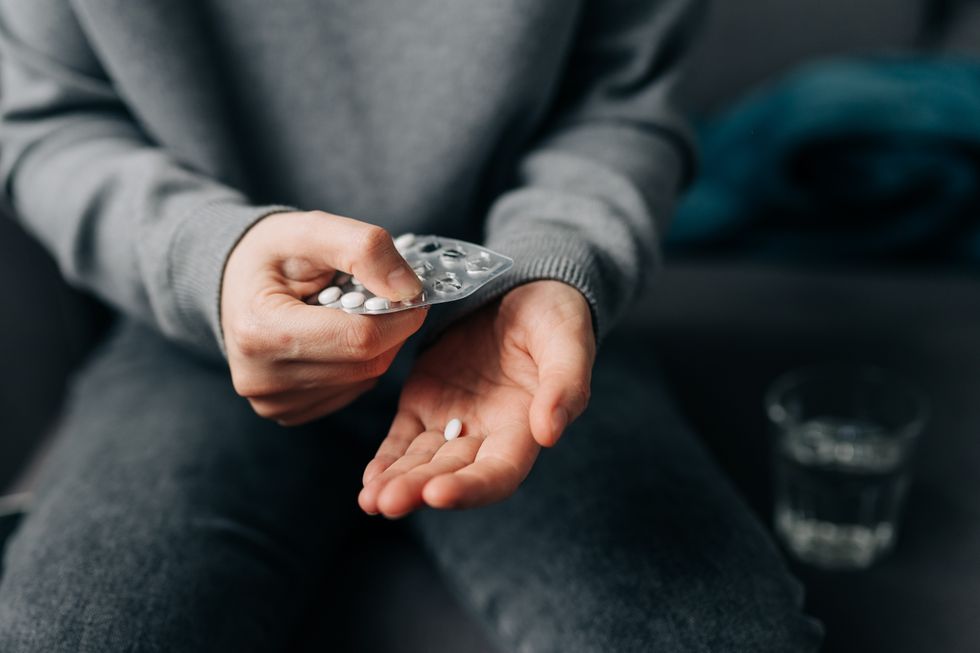Proton pump inhibitors (PPIs), which help reduce stomach acid, were prescribed more than 74 million times in England during 2023 alone
GETTY
A 2017 study involving around 350 elderly participants found that approximately one-sixth of depression cases could be attributed to PPI use
Don't Miss
Most Read
Trending on GB News
Millions of Britons taking common heartburn medications could be at risk of developing depression, experts have warned.
Proton pump inhibitors (PPIs), which help reduce stomach acid, were prescribed more than 74 million times in England during 2023 alone.
These widely-used medications are just one of several routine drugs that could trigger symptoms of depression in patients.
The pills, which include omeprazole and lansoprazole, can interfere with the body's absorption of vitamin B12, a crucial nutrient for maintaining mental health.
The NHS acknowledges that vitamin B12 deficiency can lead to various psychological problems, ranging from mild depression to confusion and dementia.
"PPIs can block anything from 80 per cent upwards of our stomach acid production," pharmacist Deborah Grayson told the Mail Online.

Proton pump inhibitors (PPIs), which help reduce stomach acid, were prescribed more than 74 million times in England during 2023 alone
GETTY
Reduction in stomach acid significantly impacts nutrient absorption from food, she noted.
The body requires these nutrients to generate serotonin, often called the "happy hormone".
Without proper nutrient absorption, serotonin production can be disrupted, potentially triggering depression and low mood.
A 2017 study involving around 350 elderly participants found that approximately one-sixth of depression cases could be attributed to PPI use.
Product information leaflets acknowledge this risk, advising patients to contact their doctor if they experience memory problems, confusion or depression while taking these medications.
Beyond PPIs, certain antibiotics have also been linked to depression risks.
Particularly concerning are fluoroquinolones, including levofloxacin and ciprofloxacin.
The NHS reports that ciprofloxacin can trigger low mood in approximately one in every 100 patients.
Scientists believe these antibiotics may affect mood by altering gut bacteria communities, which play a role in brain hormone production.
Antibiotics eliminate both harmful pathogens and beneficial gut bacteria in the process.
To counter this effect, some patients are advised to take probiotic supplements following antibiotic treatment to restore their gut microbiome.
Common medications like topiramate and gabapentin, marketed as Topamax and Neurontin respectively, are prescribed approximately 700,000 times monthly in Britain.
These drugs are known to trigger depression or mood changes in about one in 100 patients.
Medical experts believe these medications may cause depression through their mechanism of suppressing electrical activity in the brain and nerves.
This suppression, while helpful in treating conditions like epilepsy, could potentially impact mood regulation.
Grayson emphasises that patients shouldn't stop taking medication if they experience depression, but should consult their GP or pharmacist instead.
The NHS advises anyone experiencing consistent depression symptoms for more than two weeks to consult their GP.
This is particularly crucial if symptoms are not improving or are affecting work and relationships.
Immediate medical attention should be sought if thoughts of suicide or self-harm occur.
"Often patients will look at the leaflet and notice one of the side-effects is depression and assume because it's written in the leaflet, they should just put up with it, which is obviously not the appropriate course of action," warned Grayson.
She adds that healthcare professionals can intervene by changing medication or checking B12 and folate levels to find ways of managing symptoms.







